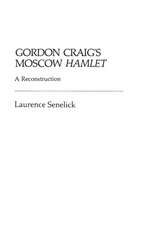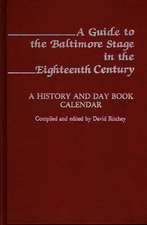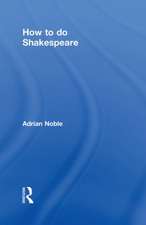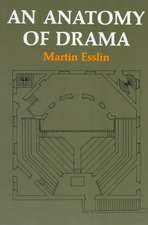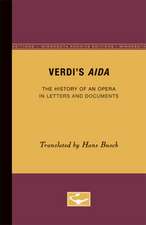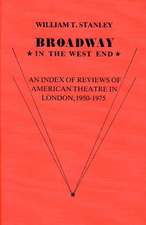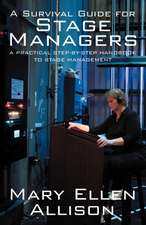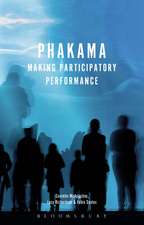How to Direct Shakespeare
Autor Adrian Nobleen Limba Engleză Paperback – 7 sep 2022
| Toate formatele și edițiile | Preț | Express |
|---|---|---|
| Paperback (1) | 146.53 lei 22-36 zile | +14.92 lei 5-11 zile |
| Bloomsbury Publishing – 7 sep 2022 | 146.53 lei 22-36 zile | +14.92 lei 5-11 zile |
| Hardback (1) | 436.15 lei 43-57 zile | |
| Bloomsbury Publishing – 7 sep 2022 | 436.15 lei 43-57 zile |
Preț: 146.53 lei
Nou
Puncte Express: 220
Preț estimativ în valută:
28.05€ • 30.48$ • 23.58£
28.05€ • 30.48$ • 23.58£
Carte disponibilă
Livrare economică 31 martie-14 aprilie
Livrare express 14-20 martie pentru 24.91 lei
Preluare comenzi: 021 569.72.76
Specificații
ISBN-13: 9781350231238
ISBN-10: 1350231231
Pagini: 248
Ilustrații: 4 bw illus
Dimensiuni: 138 x 216 x 22 mm
Greutate: 0.33 kg
Editura: Bloomsbury Publishing
Colecția The Arden Shakespeare
Locul publicării:London, United Kingdom
ISBN-10: 1350231231
Pagini: 248
Ilustrații: 4 bw illus
Dimensiuni: 138 x 216 x 22 mm
Greutate: 0.33 kg
Editura: Bloomsbury Publishing
Colecția The Arden Shakespeare
Locul publicării:London, United Kingdom
Caracteristici
Written with the authority of one of the great directors of our time who was Artistic Director of The Royal Shakespeare Company for over a decade
Notă biografică
Adrian Noble is a freelance director of theatre, opera and film, whose work can be seen in the UK, USA, Canada, China, Hong Kong and across Europe. He was the Artistic Director of The Royal Shakespeare Company, 1991-2003, and of the Shakespeare Festival, San Diego, USA, 2010-2013. In 2014 Nobel was Mellon Visiting Artist and Thinker at Columbia University, USA. He is the recipient of multiple awards and honours in the UK, USA and Europe.
Cuprins
Acknowledgements and thanks List of Illustrations Introduction Chapter 1: You Chapter 2: Him Chapter 3: The Director and the text Part 1: The World (Who's Who)Part 2: Reading the PlayPart 3: Analysing the PlayPart 4: Entering Shakespeare's World Chapter 4: Awayday One; Dramatic Energy (How does he do it?) 1: Apposition 2: Metaphor 3: Metre and Pulse 4: Line Endings 5: Word Play 6: Vocabulary 7: Shape and Structure Chapter 5: Let's Design it! The Eye To Start: 1: Wall of Ideas 2: Read the Play 3: Analyse 4: BrainstormThe ModelA Methodology Space The mechanics Floors Entrances Axes WallsThe Skeleton of the PlayThe Journey and two Casebooks Playtime"In the Round"ThrustTechnology (How to get from A to B)Colour, Texture and DecorationStoryboardShow and TellCostume and the ActorWorking with Lighting Designers Chapter 6: Design (The Ear) Music and Sound Chapter 7: Casting the Play 1. The Actor's World2. Do I Cast the Part or the Actor?3. The Process4. Putting it Together Chapter 8: Awayday Two: Stanislavski and Actioning Chapter 9: To Cut or Not to Cut LengthShapeChoice of Edition Chapter 10: The Rehearsal Plan The Traditional WayBasic Aims of RehearsalMaking a Plan Chapter 11: Rehearsing the Play; the Beginning The Rehearsal RoomStage ManagementAn Approach to Day One of Rehearsals Chapter 12: Awayday Three: Improvisation 1. Building a Company2. Building a Character3. Developing Relationships and Exploring the World of the Play4. Exploring Scenes and Situations without using the text Chapter 13: Rehearsing the Play: End of the Beginning Work on LanguageWork on Character Chapter 14: Rehearsing the Play: Middle Aims for Middle Section of RehearsalsExamples from Romeo and Juliet"The Tank"BlockingBlocking Large Scale ScenesSecond Pass at ScenesWhat to do if your Actors get Inhibited or Stuck Chapter 15: Rehearsing the Play: End First Run Through: How does it Work?How to give your NotesSecond and Third Run ThroughsPreparing for the Theatre Chapter 16: The "Tech", "Dress", Previews and Opening 1. The Tech; How to set up a Tech and how to run a Tech2. The Dress3. Curtain Calls4. Previews5. Opening Index
Recenzii
How to Direct Shakespeare is a 'must have' book for ALL directors- experienced and aspiring! Adrian Noble shares his vast experience and leads the reader through the whole journey of directing Shakespeare's plays from the preparation through all stages of rehearsal leading up to the opening night. It's a wonderful companion to his How to Do Shakespeare for actors. However his guidance can be used for directing any plays as it gives a wonderful insight into a director's process. Invaluable.
To be in rehearsal of a Shakespeare play with Adrian Noble is a gift to any actor. He is, quite simply, a brilliant director, and now in How to Direct Shakespeare, he guides us through every step of his directorial process with perfect precision and infinite generosity. Hugely informative and insightful, this book is an invaluable asset to any actor or director.
Adrian Noble and I were contemporaries at the Drama Centre in the early seventies. In 1978, he asked me to play Titus Andronicus at the Bristol Old Vic; it was my first Shakespeare - and his. For me it was like climbing a particularly craggy mountain, but from the first day it was clear that Adrian had a direct line through to the play, its world and, especially, its author, and if I managed it at all, it was largely due to him. In this indispensable book, he shares that extraordinary understanding and connection with anyone who wants to direct Shakespeare, with crystal clarity and a fund of insights both practical and penetrating. Above all, he makes it clear that to stage Shakespeare, directors have to bring their entire being to the work; nothing less will do.
To be in rehearsal of a Shakespeare play with Adrian Noble is a gift to any actor. He is, quite simply, a brilliant director, and now in How to Direct Shakespeare, he guides us through every step of his directorial process with perfect precision and infinite generosity. Hugely informative and insightful, this book is an invaluable asset to any actor or director.
Adrian Noble and I were contemporaries at the Drama Centre in the early seventies. In 1978, he asked me to play Titus Andronicus at the Bristol Old Vic; it was my first Shakespeare - and his. For me it was like climbing a particularly craggy mountain, but from the first day it was clear that Adrian had a direct line through to the play, its world and, especially, its author, and if I managed it at all, it was largely due to him. In this indispensable book, he shares that extraordinary understanding and connection with anyone who wants to direct Shakespeare, with crystal clarity and a fund of insights both practical and penetrating. Above all, he makes it clear that to stage Shakespeare, directors have to bring their entire being to the work; nothing less will do.

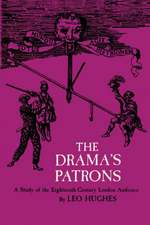
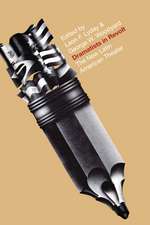

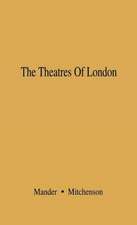

![Theatre at Stratford-Upon-Avon [2 Volumes]: Set. a Catalogue-Index to Productions of the Shakespeare Memorial/Royal Shakespeare Theatre, 1879-1978](https://i1.books-express.ro/bt/9780313221262/theatre-at-stratford-upon-avon-2-volumes.jpg)
